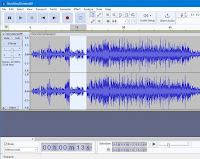It's been a long time since the last post. I'm still here, and still working on related projects. Mainly the Glory Glory Dixieland version of Battle Hymn of the Republic, performed by the University of Georgia. It's been an ongoing project for a couple of months. I thought it would be easier, since Southern Gospel and Dixieland Jazz have some similar elements, but the differences are dramatic. Aside from the issue of one piano trying to match the output of a whole band, the melody line is breaking my brain. It sounds so fun, and so perfect, just to listen the the band play. Then I try to break down the parts, and they wander over, under, in, and around the melody without actually hitting the melody, yet it all blends together and sounds fabulous as a whole.
Honestly, my hat is off to the Redcoat Marching Band. Tons of respect for their superhuman skills!
Yesterday marked a major accomplishment. I've finally learned the entire song. Now, it's time to learn to play it all smoothly, as a single cohesive song, and match my timing up to the band. I'll probably never be able to play it as fast as the band does. I'm using two hands, and trying to manage base (which again, is more complex than Southern Gospel), back-up chords, and melody, in an impossible attempt to live up to the example set by the University of Georgia's marching band.
In particular, I'm using the last two fingers of my right hand, with a greater spread and more complex patterns, than usual. Resulting in a good bit of pain, especially at the base of my wrist, on the side under the pinkie finger. Time enough to rest it later. Right now, on a roll and want to push through. I may not be an entire band, but am pretty pleased with how the song is working out. Even if it's slower, I'm going to practice to improve, and then record it.
OFF TOPIC
In the meantime, totally off the usual topic, I'm up early this Sunday morning with a problem that wouldn't let me sleep. Writing usually helps, and this is my blog, so I'm diverging from the beaten path today to help get this off my mind:
Woke up too early. Restless night with a recurring dream. Dreamed I was working a full-time job, but that wasn't the focus of the dream so I've no idea what the main job was. This dream focused on a part-time job I went to after work. It was run like a Blockbuster, with the checkout area very much like the old days. The people I worked with were nice, though a little distant. The drive was long, but it was through gorgeous wooded country roads, so overgrown it was almost tunnel-like. As much as I hate and fear driving, this was an enjoyable trip. Never met anybody else driving on this road. It was just me, and the days were always a pure blue color, with occasional small white clouds drifting along. At work, it was a combination Blockbuster and old country store. They sold an eclectic collection of things, and were rarely busy. I might have had four co-workers, who came in at one time or another. In the first dream, one of my co-workers had a customer who was kind of a trouble-maker, in an Andy Griffith mean-old-man kind of way. They had to step away from the till to discuss his problem, but first he was determined to prove his identity by showing his signature, hand-scribbled on the back of the comics page from an old newspaper. Then he went on at length about a walking cane he bought, and how much he disliked it. He complained that it splashed him when it rained, and he'd get muddy walking along with it.
The dream faded there, and I woke up for a while. When I went back to sleep, the dream continued but on another day. Same drive to work, but for some reason it was crowded and busy, and we had four lines running, each deep with people waiting their turn. I thought to myself that I had taken this second job for added income, but also, because it was enjoyable. When it got that busy, I was regretting being there. Then a man roughly late-30's or early-40's stepped up to my till, and before he'd tell me what he wanted, he had to go through the same rigamarole about proving his identity by showing his signature on the back of the comics page from an old newspaper. This time around, I noticed he was using the Sunday funnies, because they were in color. Then he had a complaint, but couldn't figure out how to tell me what it was. He wanted me to wait there while he went outside, but the person who came back was the old man from the first dream, who also wanted to show me his signature on the piece of paper again, then launch into the same tirade about his cane. I wondered why he hadn't returned the cane last time, took a look at the huge line of customers waiting at all the tills, and said "Oh, please, sir, not with all these people waiting. I heard the whole story the first time."
He seemed to agree, was about to speak, and I woke up again. I lay there a moment, trying to go back to sleep; then realized I didn't want to go back to that same dream and continue to listen about his cane. Checked my watch, it was almost 6:00. Got up but the dream kept haunting me. Now I'm sitting here writing it out, because it's going to haunt me until I get it written down.
Now I'm done. But I'm still not going back to sleep. I quit, they can get someone else to listen to that guy complain about his cane.



